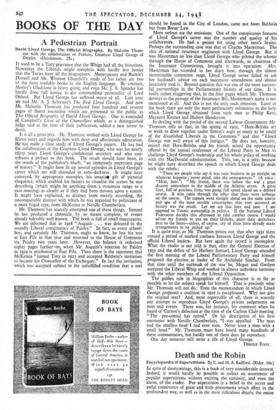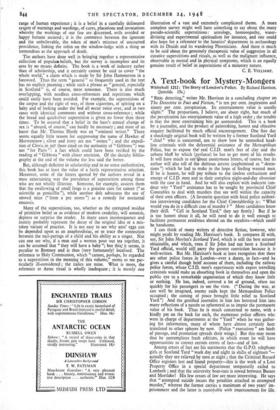Death and the Robin
Encyclopaedia of Superstitions. By E. and M. A. Radford. (Rider. 16s.) IN spite of shortcomings, this is a book of very considerable interest. Indeed, it would hardly be possible to collect an assortment of popular superstitions without exciting the curiosity, and even the alarm, of the reader. For superstition is a belief in the secret and awful connivance of great and little phenomena which affect in the profoundest way, as well as in the most ridiculous details, the entire
•
range of human experience • it is a belief in a carefully delineated system of warnings and wardings, of cures, placations and invocations whereby the workings of our fate are discerned, evils avoided or happy fortune secured; it is the commerce between the ignorant and the unbelievable, the token of man's mistrust of uncourted providence, linking the robin on the window-ledge with a thing so tremendous as the approach of death.
The authors have done well in bringing together a representative collection of populate beliefs, but the survey is incomplete and its area by no means definite. The book is a work of industry rather than of scholarship, and it certainly cannot be said to cover " the whole world," a claim which is made by. Sir John Hammerton in a foreword. Thus the term " general " so frequently used in the text has no explicit meaning ; while such a phrase as " general, especially in Scotland " is, of course, mere nonsense. There is also much overlapping, with needless cross-references and repetitions which could easily have been avoided. For example, the superstitions of the corpse and the right of way, of three cigarettes, of spitting on a baby and of looking under the bed all eccur twice over, and in two cases with identical comments and without cross-reference ; while the bread and quicksilver superstition is given no fewer than three times. To be assured that a belief in the hare's annual change of sex is "absurd, of course," can hardly be. necessary ; and most of us know that Mr. Thomas Hardy was an " eminent writer." There seems equally little reason for suppressing- the name of Hawker of Morwenstow ; silver and ivory are not " stones "and the expedi- tion of Clovis in 507 (here cited on the authority of Gibbons ") was not "for Paris " : a fact which could 'have been verified by the reading of " Gibbons " with closer attention. Of the sketchy biblio- graphy at the end of the volume the less said the better.
But, although deficient in scholarship and in no sense authoritative, this book has at least the value of a fairly representative selection. Moreover, some of the letters quoted by-the authors reveal in a most entertaining way the prevalence of superstition among those who are not wholly illiterate. Someone, for example, assures them that the swallowing of small frogs is a genuine cure for cancer (" as scientific as penicillin "), while another dolt advocates the use of stewed mice (" from a pet stores ") as a remedy for nocturnal enuresis.
Many of the superstitions, too, whether as the corrupted residue of primitive belief or as evidence of modern credulity, will astonish, depress or surprise the reader. In litany cases inconsequence and inanity probably represent the decay of the original idea or a mis- taken variant of practice. It is not easy to see why ants' eggs can be depended upon as an anaphrodisiac, or to trace the connection between the nail-parings of a child and his ability as a singer. Nor can one see why, if a man and a woman pour out tea together, it can be assumed that " they will have a baby "; but this; it seems, is peculiar to Romney and is thus (very fortunately) localised. The reference to Holy Communion, which "cannot, perhaps, be regarded as a superstition in the meaning of this volume," seems to me par- ticularly ill-considered ; the italics are mine. What is more, the reference to Aztec ritual is wholly inadequate ; it is merely one
illustration of a vast and extremely complicated theme. A more complete survey might well have something to say about the, many pseudo-scientific superstitions : astrology, homoeopathy, water- divining and experimental spiritualism for instance, and one could also hope for a reference' to the lunatics' department in archaeology with its Druids and its wandering Phoenicians. And there is much to be said about the genuinely therapeutic value of suggestion in all curative superstitions and rituals, as well as the malignant influence, observable in mental and in physical symptoms, which is an equally genuine result of belief in_ superstitions of a minatory nature.
C. E. VULLIAMY.



































 Previous page
Previous page